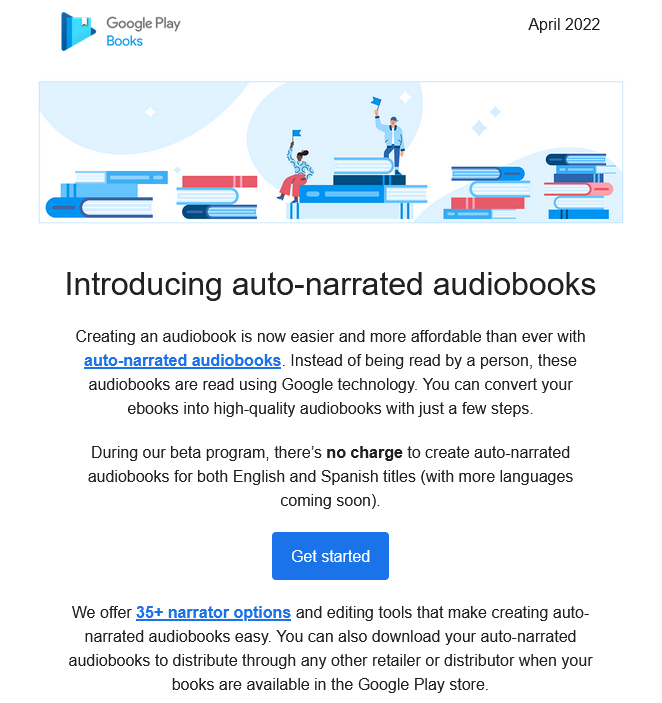
AI or digital narration is nothing new. If you own an Apple, Google, or Amazon device and use either Siri, Google Assistant, or Alexa, then you're already interacting with digital narration. Even more so if you're an audiobook listener and have had an AI read that book to you. But recent developments, including better narration quality, options for different AI narrator voices, and, probably the most important, Google opening their AI narration service to all, have created new possibilities and attracted my attention as an author because I have been unable to offer audio formats of my books up to this point.
But has narrator quality improved enough for me to make the leap and forego human narration altogether? Let's discuss.
A brief discussion about Google AI Narration
I'm going to talk specifically about Google here because, right now, they're leading the charge. Last month, they sent me this email:

Intrigued by the narrator options and, quite frankly, the "no charge" bit, I started listening to the different narrators. You can roughly break them down by gender, accent, age, and language. I quickly discovered one that I thought would work great for my Alchemancer series, so I created a new audiobook project and gave chapter one a listen. I have to say, I was and still am thoroughly impressed with the quality of the AI narration. You can almost imagine you really are listening to a real person reading to you. It isn't perfect. It isn't as good as human narration. But it is good. The individual voices are distinctive, they often carry the right inflection, and the pronunciation was much better than I was expecting, especially when it came to words I literally made up (I do write fantasy, after all).
So where does it fail?
The voice can be monotonous at times, especially since the concept of different voices based on the characters in a novel is not currently supported. The inflections are often right, but they're also sometimes wrong. I sometimes italicize words in my books to signify such inflections, but the text content for Google audiobooks does not support italics (or any other formatting), so when I copied the text of my novel, those formatting options were lost. Also, while the pronunciation was better than I was expecting, a frequent stumbling block was homographs (words that have the same spelling, but different pronunciations and meanings). One I ran into several times was "closer" (denoting someone who closes a door, for ex.) vs "closer" (denoting proximity). The AI process was unable to determine which one I meant, and, in fact, I think it was just defaulting to the first pronunciation.
Fortunately, the editing tool allowed me to do a global search and replace to correct the pronunciation of this word and many others, so the process of fixing these sorts of errors was not hard, but it was time-consuming as I had to listen and really pay attention to the narration of my entire book in order to spot them.
So what does this mean for human narrated audiobooks?
For right now, I don't think it means anything. I say that for two reasons.
First, I spent a lot of time listening to the digital narration of the first book in my Alchemancer series, The Five Elements, and I thought it sounded great. But then I listened to human narrated audiobooks for comparison and, I must say, the difference in engagement and quality was quite astounding. AI simply cannot produce better content than a real person at this time.
Second, I think that human and digitally narrated audiobooks can happily co-exist in the marketplace alongside one another. Think about it. If you're someone who truly enjoys the audio experience with everything that human narration can offer, then choose that option by listening to human narrated audiobooks. If, however, you're ok with the same narrator voicing each and every character and don't mind the occasional AI narrated error (ideally, the author would catch these, but we should also have print books that are free of typos and misspellings and how often does that happen?), then digital narration may be for you.
Further, and this is one of the best parts, as an author I can offer each format at a different price point. Human narration is expensive, so if and when I go that route I will need to charge a premium to recoup my costs. Digital narration, however, is free for the time being, and will presumably remain at a low cost for the foreseeable future, so I can offer those at a much lower price where you're really only paying the intellectual property cost. I love this because I can effectively lower the barrier to entry to my books so a wider audience can enjoy them.
The last point I want to touch on here is the question about what AI narration means for voice actors who make their living narrating audiobooks. Mark Williams with The New Publishing Standard says it best:
No, AI narration will not put competent real-life narrators out of jobs any time soon, if ever. What it will do is open up audio to authors and publishers to reach new consumers with acceptable, if not superb, narration that will bring in revenue from low-profile and backlist titles that would otherwise never make it to the audiobook platforms.
So what does all of this mean for my books?
So the real question here is when am I going to offer my books in audiobook format? I am of two minds on this. Human narration is, unfortunately, not in my budget currently. They are simply too expensive to produce and I can't take the risk that they don't earn out. Digital narration is therefore intriguing to me because I can produce those right now for free and offer them at a reasonable price point to consumers. I've already produced The Five Elements using Google's narration tools. It's only waiting on me to hit the publish button. I plan to do the same for book two in the near future. But even with the second book completed, I'm hesitant to take that next step for two reasons. One, I would prefer to release my books using human narration first, then have the digital narrated versions available as a second option. Two, I'd like to finish the series first. Any time or energy I spend on books one and two takes away from book three, which really needs to be my focus for the next 3-6 months.
Conclusion
Digital narration is getting better and better. While I don't think it will replace human narration anytime soon, it is a very good option as a secondary offering for those who want to purchase audiobooks at a lower price point and who don't mind the idiosyncrasies of AI narration. While I'm not ready to jump completely in with my own books yet, I am thinking of doing some experimentation where I release the digitally narrated audiobooks for a limited time to gauge interest and response. If enough people feel the digital narration is "good enough," then it might be good enough for me too.
More Reading

Join today to receive a notification when I have a new release available or when I'm taking part in a mega-sale where you can get some great book deals. As a thank you, I'll send you two free eBooks—The Assassin's Dilemma and The Hall of Riddles.